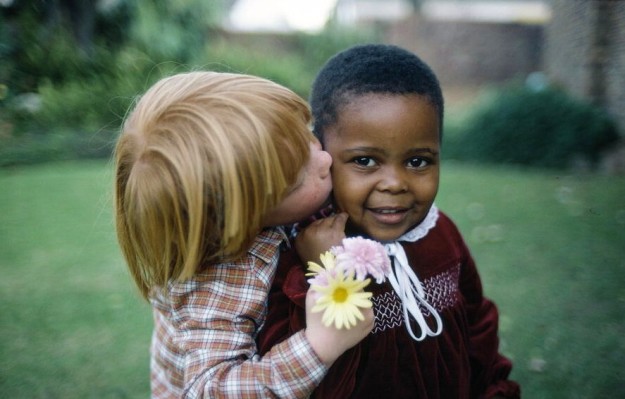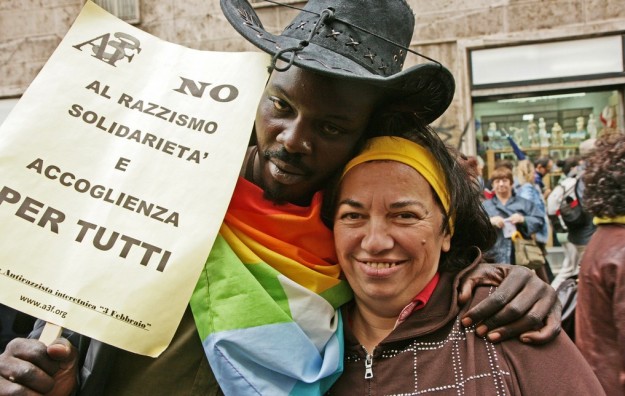Is Racism Cultural or Natural?
To postulate racial discrimination as being natural to the human condition is tantamount to granting to racism a universal biological grounding. In this regard, it would be normal to assume that human beings are racist to varying degrees in their relationships with people of different racial origins. Therefore, the issue of racism taken in this light is not basically one of ethical concern, since it would ordinarily be assumed and expected that in normal circumstances all human beings would be more or less racist. Superficially, this does not look harmful at all and could be regarded as negligible, because racism, or being “race-centered” could simply be taken as a natural attitude of giving more importance and concern to the well being of the people of the particular race in which one belongs, somewhat like our attitude of showing more concern and love for our own families: that is, being family-centered without necessarily being antagonistic or adversarial towards other families.
Not being a professional scientist, and much less a trained biologist or geneticist, it is not within the scope of my present concern to investigate, in the general sphere of biology and the specialized discipline of genetics, the possibility of racial discrimination as being inherent and therefore natural to the biological constitution of the human organism. Besides, the assumptions on the issue at hand that perhaps racism is natural are all theoretical and do not meaningfully connect with what has actually taken place so far in the course of human history. Racial discrimination, as we have witnessed it, is fraught with animosity, violence and even death of genocidal magnitude. Considering all these conditions, the issue of racism as being natural is not really under attack — at least, not yet — but a concern that needs to be addressed with ethics in mind.
It is an unquestionable human reality that there are in us certain natural, and thus inherently biological, tendencies to act in ways that could be offensive and injurious to others in varying degrees. It does not necessarily follow, however, that something of a natural character should at all times be given expression based on the single assumption that it is inherently biological. In this connection, the more serious issue is not whether racism is natural or otherwise but the fact that, through generations in human history, racism has wrought havoc in lives and caused massive destruction of property in practically all parts of the world. Even if one assumes uncritically that racism is natural, it is nevertheless an extremely grievous specter of dehumanization that needs to be overcome.
“Ignorance and prejudice are the handmaidens of propaganda.” – Kofi Annan
Opposed to the above position is the belief that racism is a matter of cultural programming. In other words, racism is learned and is never natural or inherently biological. Here it is generally considered that a human child is fundamentally “color blind,” i.e., devoid in any consciousness of whatever pertains to racial discrimination. This position, in my opinion, is both empirical and reasonable because we have witnessed and observed many convincing instances where cultural orientation is the culprit in societies where racism has become an alarming situation. Its toxicity is passed on from one generation to the next, and the programming process starts at home. Young children are conditioned to believe that, since they belong to a race more superior than those of the others, the basic norm is not to mix with others. Beyond this, the more dangerous attitude that is developed and sustained during maturation is one of animosity and hatred.
Reinforcement is such an important aspect of cultural programming that, in the context of a society where racial discrimination is highly pronounced, racists actually go beyond the conditioned acts. They even advance towards the level of intellectually thematizing their racism by coming up with seemingly objective studies on the issue of their racial superiority on the one hand and the inferior characters of other races, on the other, by invoking principles grabbed from the pseudo-science of eugenics. At its most blatant and heinous operationalization, racism acquires a strong political color and, in certain known and recorded instances, is termed “ethnic cleansing”.
Racism in its cultural form is sustained by reified principles that constitute the dynamics of how the next generation should be programmed like its predecessors. A new set of conditioning mechanisms may be assembled to adapt to new exigencies, but the dynamics remain the same. There is in fact a preponderance of empirical evidence in history and current events to support the notion that racism is first and foremost a matter of culture and not of nature. The races are natural, but racism is fundamentally cultural. We saw this in South Africa during an apartheid era, which Palestine has likewise been going through for generations while being oppressed by Zionist Israel.
Racism as a practice is not a monolithic challenge, but it is in most, if not all, instances coincidental with political, economic or social factors, or even a combination of any or all of these factors. This consideration further sustains the notion that racism is more cultural than natural. In the case of Nazi Germany, racism was coincident with an adversarial positioning against what was then perceived as being Jewish dominance in the economic affairs of Germany. In the United States, racial discrimination by European-Americans against African-Americans was more of a social-status issue, which had grown from an economic condition that spawned the mentality that the raison d’etre of black Americans in the US was to be “used as tools of economic production”.
Pockets of racism, big and small, exist throughout the world. Yet there is nothing to blame for this hideous problem except the fact that cultural differences are exploited to spawn racism and often to drive it onwards to its most despicable forms. As George Orwell noted: “All nationalistic distinctions–all claims to be better than somebody else because you have a different-shaped skull or speak a different dialect–are entirely spurious, but they are important so long as people believe in them.” In a world that is multi-cultural and multi-ethnic, racism has become the ultimate tool of division between people by those in power. Although culture contributes to racism and exploits some natural tendencies, racism is nevertheless a heinous practice that is poisonous to the human spirit and belongs in the trash bin of human history.
Editor’s Notes: Photographs one, two and four from the United Nations archive; photographs three, five and eight by Eugenio; photograph six from the archive of UK Department for International Development; seven by Michael Loadenthal; and nine from the archive of Light Brigading.
Related Articles





















You must be logged in to post a comment Login